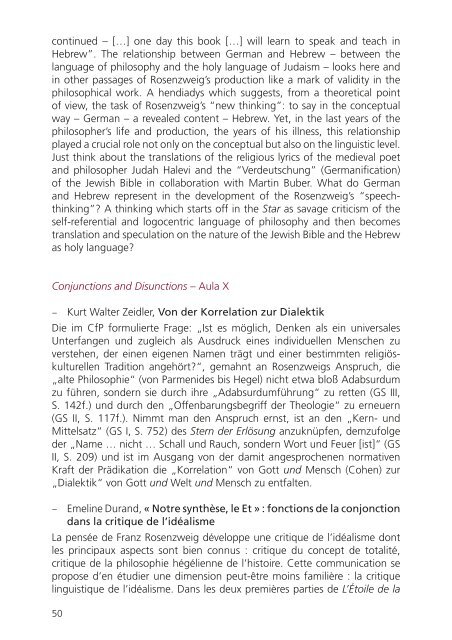Franz Rosenzweig
VZ2hG1
VZ2hG1
You also want an ePaper? Increase the reach of your titles
YUMPU automatically turns print PDFs into web optimized ePapers that Google loves.
continued – […] one day this book […] will learn to speak and teach in<br />
Hebrew”. The relationship between German and Hebrew – between the<br />
language of philosophy and the holy language of Judaism – looks here and<br />
in other passages of <strong>Rosenzweig</strong>’s production like a mark of validity in the<br />
philosophical work. A hendiadys which suggests, from a theoretical point<br />
of view, the task of <strong>Rosenzweig</strong>’s “new thinking”: to say in the conceptual<br />
way – German – a revealed content – Hebrew. Yet, in the last years of the<br />
philosopher’s life and production, the years of his illness, this relationship<br />
played a crucial role not only on the conceptual but also on the linguistic level.<br />
Just think about the translations of the religious lyrics of the medieval poet<br />
and philosopher Judah Halevi and the “Verdeutschung” (Germanification)<br />
of the Jewish Bible in collaboration with Martin Buber. What do German<br />
and Hebrew represent in the development of the <strong>Rosenzweig</strong>’s “speechthinking”?<br />
A thinking which starts off in the Star as savage criticism of the<br />
self-referential and logocentric language of philosophy and then becomes<br />
translation and speculation on the nature of the Jewish Bible and the Hebrew<br />
as holy language?<br />
Conjunctions and Disunctions – Aula X<br />
– Kurt Walter Zeidler, Von der Korrelation zur Dialektik<br />
Die im CfP formulierte Frage: „Ist es möglich, Denken als ein universales<br />
Unterfangen und zugleich als Ausdruck eines individuellen Menschen zu<br />
verstehen, der einen eigenen Namen trägt und einer bestimmten religiöskulturellen<br />
Tradition angehört?“, gemahnt an <strong>Rosenzweig</strong>s Anspruch, die<br />
„alte Philosophie“ (von Parmenides bis Hegel) nicht etwa bloß Adabsurdum<br />
zu führen, sondern sie durch ihre „Adabsurdumführung“ zu retten (GS III,<br />
S. 142f.) und durch den „Offenbarungsbegriff der Theologie“ zu erneuern<br />
(GS II, S. 117f.). Nimmt man den Anspruch ernst, ist an den „Kern- und<br />
Mittelsatz“ (GS I, S. 752) des Stern der Erlösung anzuknüpfen, demzufolge<br />
der „Name … nicht … Schall und Rauch, sondern Wort und Feuer [ist]“ (GS<br />
II, S. 209) und ist im Ausgang von der damit angesprochenen normativen<br />
Kraft der Prädikation die „Korrelation“ von Gott und Mensch (Cohen) zur<br />
„Dialektik“ von Gott und Welt und Mensch zu entfalten.<br />
– Emeline Durand, « Notre synthèse, le Et » : fonctions de la conjonction<br />
dans la critique de l’idéalisme<br />
La pensée de <strong>Franz</strong> <strong>Rosenzweig</strong> développe une critique de l’idéalisme dont<br />
les principaux aspects sont bien connus : critique du concept de totalité,<br />
critique de la philosophie hégélienne de l’histoire. Cette communication se<br />
propose d’en étudier une dimension peut-être moins familière : la critique<br />
linguistique de l’idéalisme. Dans les deux premières parties de L’Étoile de la<br />
50


